Monroe Doctrine Worksheets
Do you want to save dozens of hours in time? Get your evenings and weekends back? Be able to teach about the Monroe Doctrine to your students?
Our worksheet bundle includes a fact file and printable worksheets and student activities. Perfect for both the classroom and homeschooling!
Resource Examples
Click any of the example images below to view a larger version.
Fact File
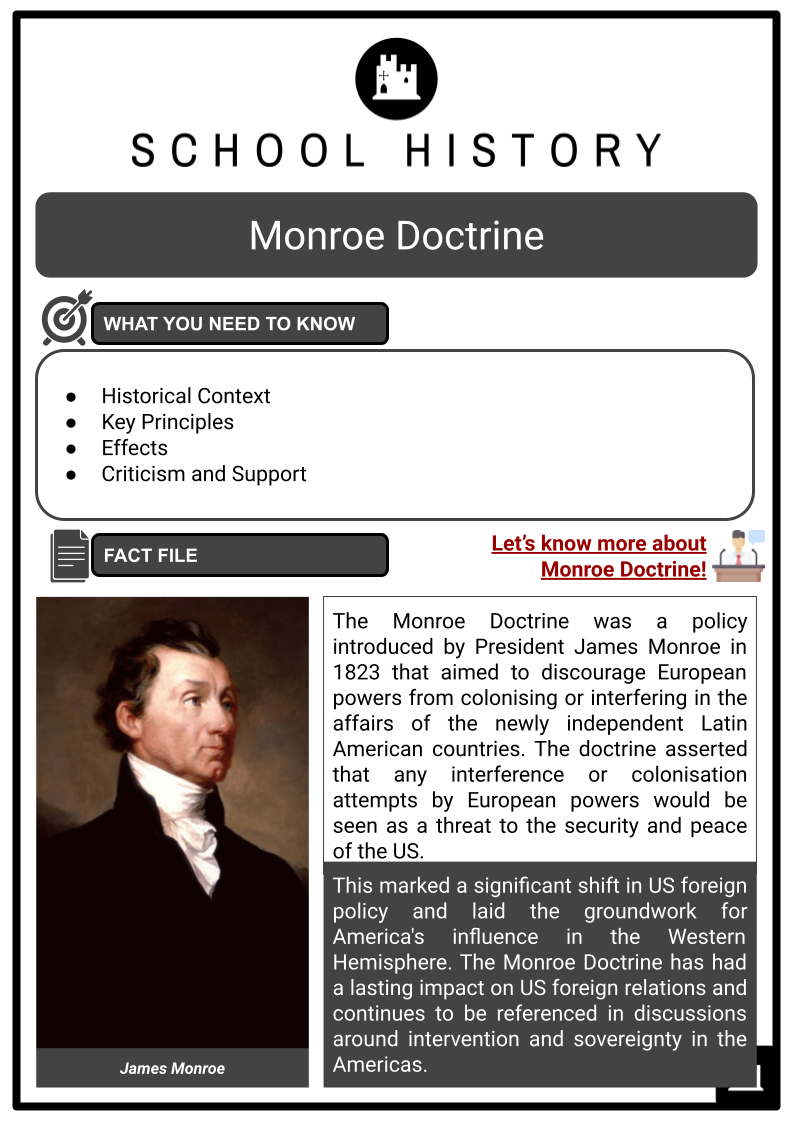
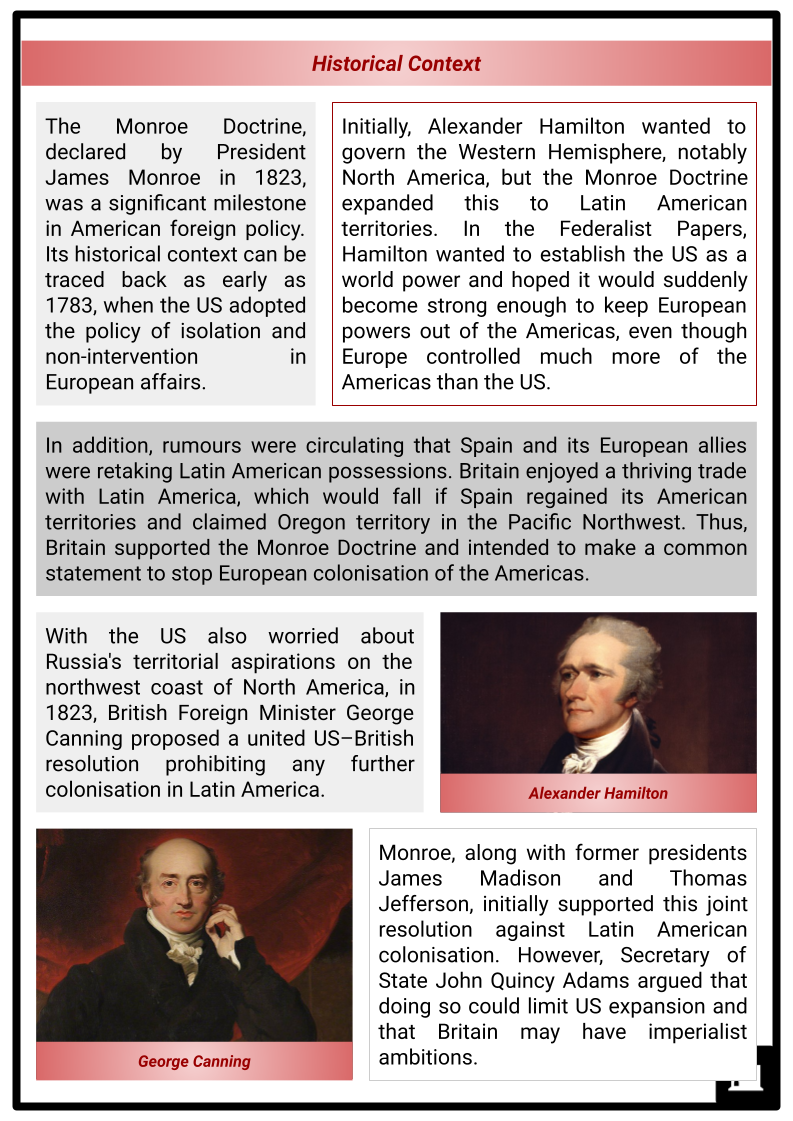
Student Activities
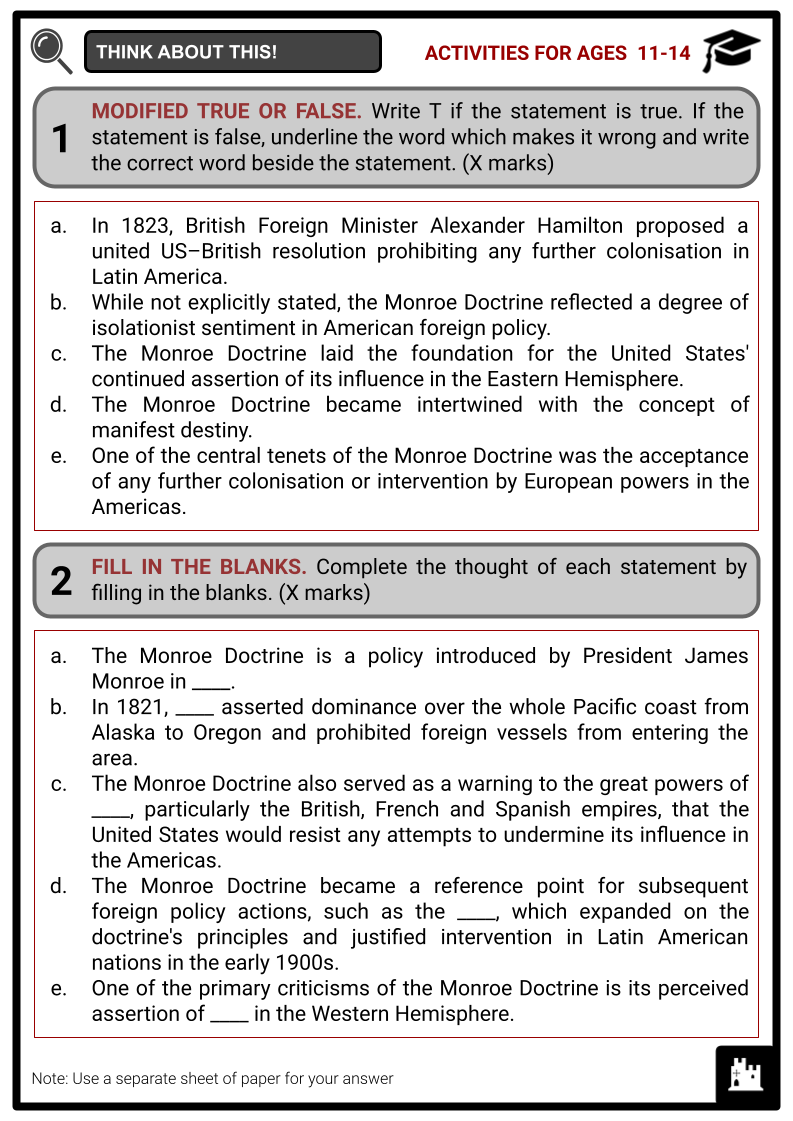
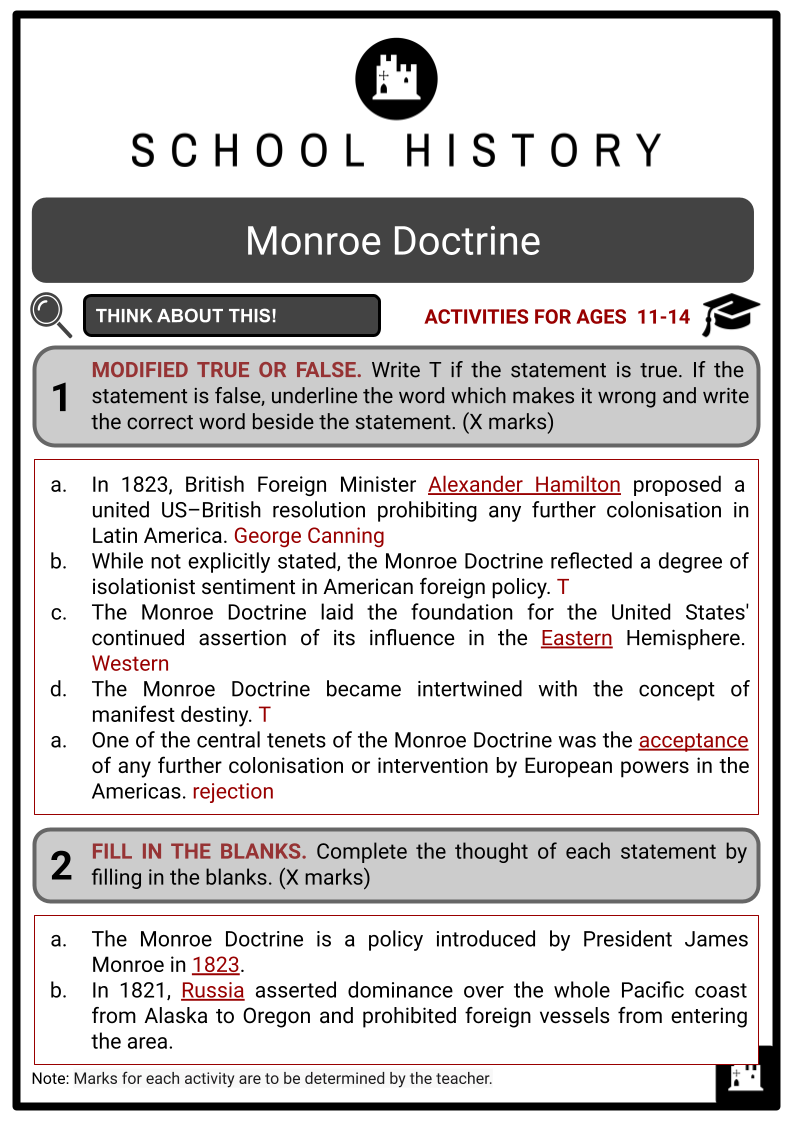
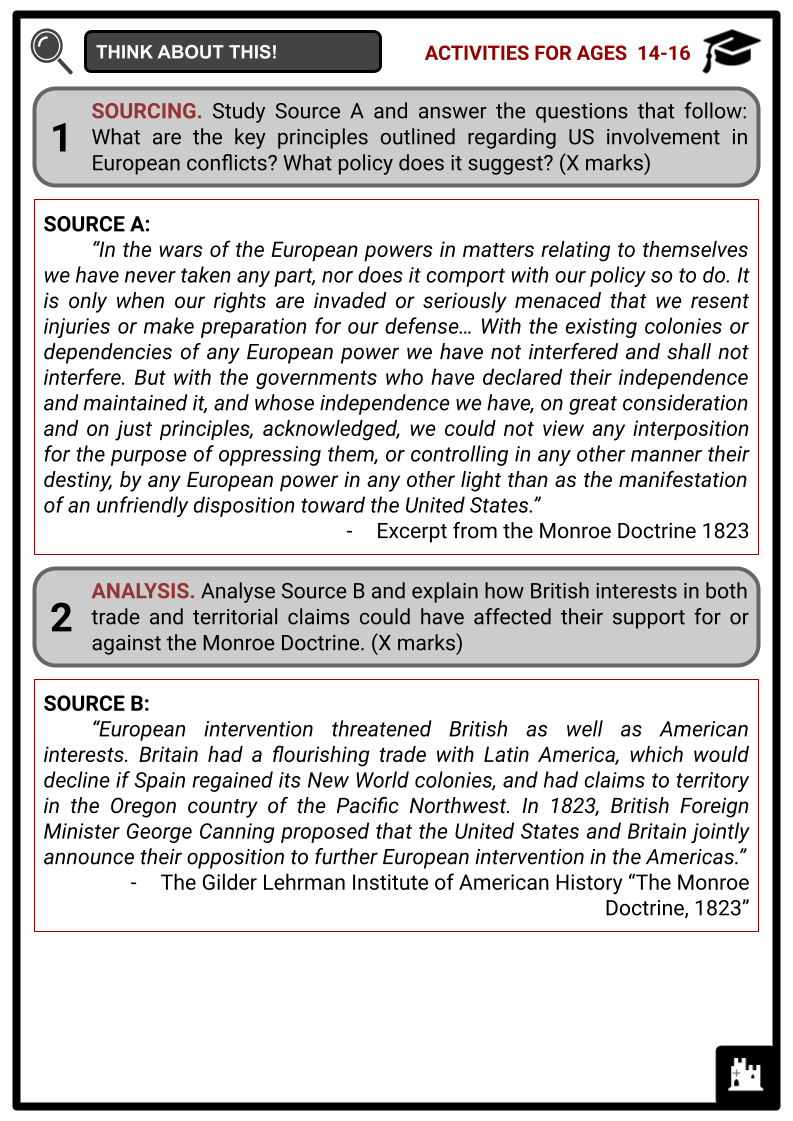
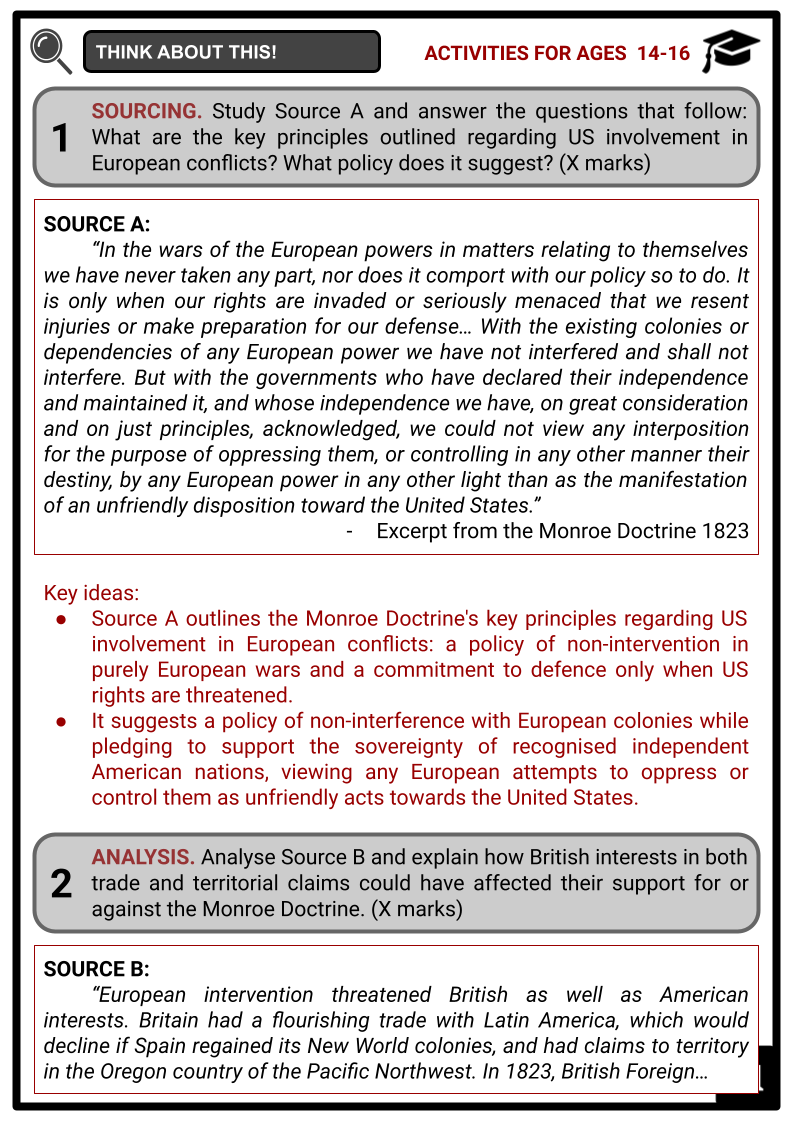
Summary
- Historical Context
- Key Principles
- Effects
- Criticism and Support
Key Facts And Information
Let’s know more about the Monroe Doctrine!
The Monroe Doctrine was a policy introduced by President James Monroe in 1823 that aimed to discourage European powers from colonising or interfering in the affairs of the newly independent Latin American countries. The doctrine asserted that any interference or colonisation attempts by European powers would be seen as a threat to the security and peace of the US. This marked a significant shift in US foreign policy and laid the groundwork for America's influence in the Western Hemisphere. The Monroe Doctrine has had a lasting impact on US foreign relations and continues to be referenced in discussions around intervention and sovereignty in the Americas.
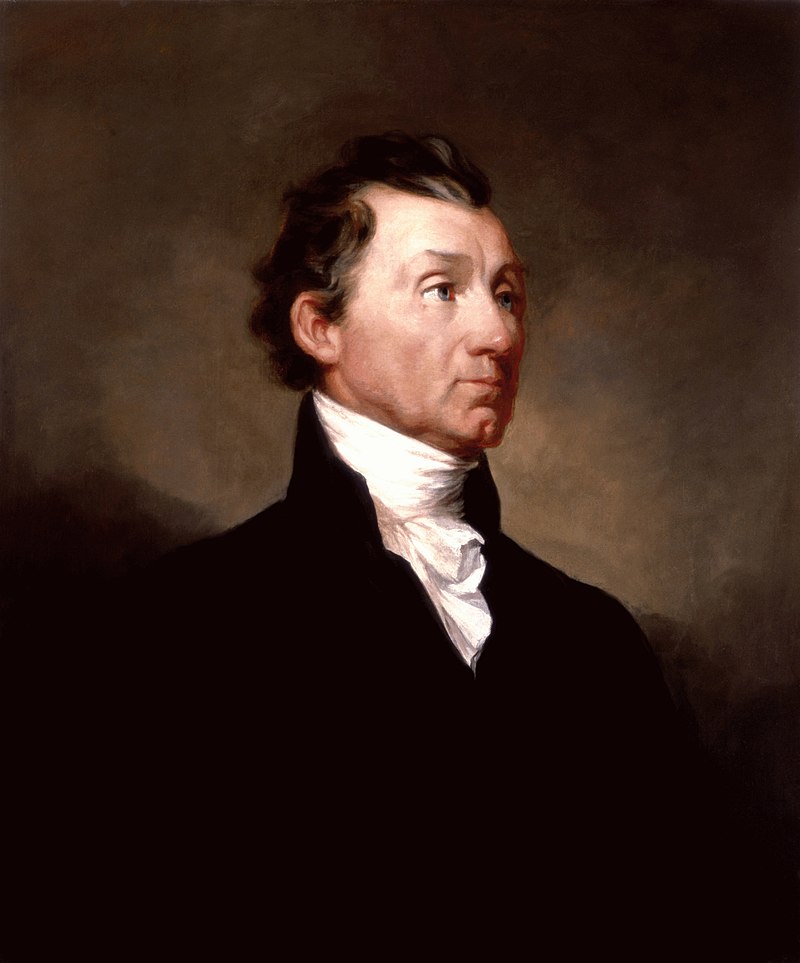
Historical Context
- The Monroe Doctrine, declared by President James Monroe in 1823, was a significant milestone in American foreign policy. Its historical context can be traced back as early as 1783, when the US adopted the policy of isolation and non-intervention in European affairs.
- Initially, Alexander Hamilton wanted to govern the Western Hemisphere, notably North America, but the Monroe Doctrine expanded this to Latin American territories. In the Federalist Papers, Hamilton wanted to establish the US as a world power and hoped it would suddenly become strong enough to keep European powers out of the Americas, even though Europe controlled much more of the Americas than the US.
- In addition, rumours were circulating that Spain and its European allies were retaking Latin American possessions. Britain enjoyed a thriving trade with Latin America, which would fall if Spain regained its American territories and claimed Oregon territory in the Pacific Northwest. Thus, Britain supported the Monroe Doctrine and intended to make a common statement to stop European colonisation of the Americas.
- With the US also worried about Russia's territorial aspirations on the northwest coast of North America, in 1823, British Foreign Minister George Canning proposed a united US–British resolution prohibiting any further colonisation in Latin America.
- Monroe, along with former presidents James Madison and Thomas Jefferson, initially supported this joint resolution against Latin American colonisation. However, Secretary of State John Quincy Adams argued that doing so could limit US expansion and that Britain may have imperialist ambitions.
- Thus, Adams pushed Monroe to declare a unilateral US policy that would set the newborn nation on its own path and claim protection of the Western Hemisphere. This led to the crafting and announcement of the Monroe Doctrine on 2 December 1823.
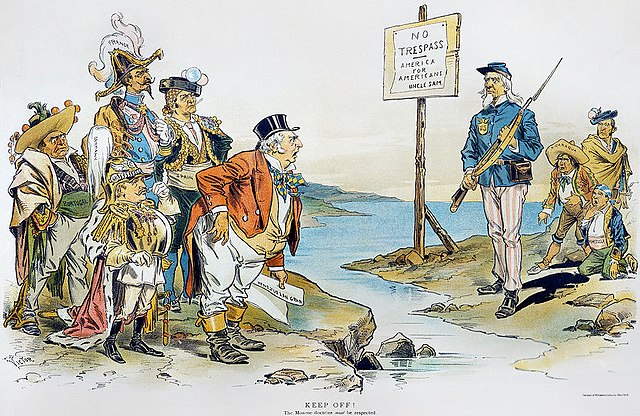
Key Principles
- In the autumn of 1823, President Monroe assembled his cabinet to address how the US should handle the possibility of European nations recolonising Spain's old colonies, now independent nations. Their meetings shaped the president's yearly address. Monroe authored the speech with cabinet assistance and Secretary of State John Quincy Adams' direct contributions.
- Monroe delivered the speech in person to Congress and distributed written copies to senators and representatives. Citizens heard about government policies from their state lawmakers and local publications. Monroe also wanted his message to reach Britain, France, Austria, Prussia and Russia, and so diplomats from states conducting international activities in Washington, DC, submitted letters to their home governments with newspaper articles.
- The Monroe Doctrine, albeit lengthy, can be summarised in two crucial paragraphs:
Introductory Statement
- The statement declares that the Americas are no longer susceptible to invasion by European nations.
"The occasion has been judged proper for asserting, as a principle in which the rights and interests of the United States are involved, that the American continents, by the free and independent condition which they have assumed and maintain, are henceforth not to be considered as subjects for future colonisation by any European powers."
Address to European Allied Powers
- The statement confirms that the US is neutral towards current European colonies in the Americas but is against any actions that would establish new colonies within the newly independent Spanish American republics.
"We owe it, therefore, to candour and to the amicable relations existing between the United States and those powers to declare that we should consider any attempt on their part to extend their system to any portion of this hemisphere as dangerous to our peace and safety. With the existing colonies or dependencies of any European power, we have not interfered and shall not interfere. But with the Governments who have declared their independence and maintained it, and whose independence we have, on great consideration and on just principles, acknowledged, we could not view any interposition for the purpose of oppressing them, or controlling in any other manner their destiny, by any European power in any other light than as the manifestation of an unfriendly disposition towards the United States."
- President Monroe also outlined three key principles in the Monroe Doctrine:
- Non-Colonisation One of the central tenets of the Monroe Doctrine was the rejection of any further colonisation or intervention by European powers in the Americas. The United States aimed to prevent the extension of European territories into the Western Hemisphere and to uphold the sovereignty of the newly independent Latin American nations. This principle was a bold assertion of the United States' opposition to external interference and expansion in its own hemisphere.
- Non-InterventionThe Monroe Doctrine also emphasised the United States' stance against European interference in the affairs of independent nations in the Americas. It conveyed the message that any attempt by European powers to intervene in the internal affairs of sovereign nations in the Western Hemisphere would be viewed as a threat to the United States.
- Sphere of InfluenceThe doctrine implied the concept of a sphere of influence for the United States in the Western Hemisphere. It asserted the primacy of American interests in the region and signalled to European powers that any encroachment on this sphere would be met with resistance. This principle laid the groundwork for the United States to assume a leadership role in the Americas and positioned the nation as a protector of the region's stability and independence.
- While not explicitly stated, the Monroe Doctrine reflected a degree of isolationist sentiment in American foreign policy. By declaring its intent to resist European intervention in the Western Hemisphere, the United States was signalling a preference for non-involvement in European conflicts and a focus on its own regional interests.
- The Monroe Doctrine also served as a warning to the great powers of Europe, particularly the British, French and Spanish empires, that the United States would resist any attempts to undermine its influence in the Americas. It indicated a change in power dynamics and demonstrated the United States' emergence as a significant player in global politics.
Effects
- The Monroe Doctrine significantly influenced American foreign policy and the global international scene.
- Firstly, the doctrine laid the foundation for the United States' continued assertion of its influence in the Western Hemisphere. It established a standard for future American presidents to uphold a firm position against external intervention and colonial attempts in the Americas. This principle of non-colonisation and non-intervention has remained integral to American foreign policy, guiding its approach to regional conflicts and its interactions with Latin American nations.
- Secondly, the doctrine significantly shaped America's relations with Latin American countries. While the US portrayed itself as a protector of Latin American sovereignty, the application of the Monroe Doctrine was often perceived as a form of American hegemony. This led to a complicated situation in the region, as Latin American countries felt thankful for the assistance against European intervention but also harboured animosity towards what they saw as American imperialism.
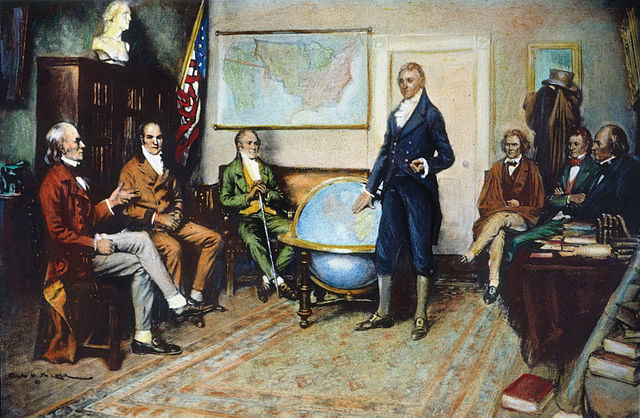
- Thirdly, the Monroe Doctrine provoked intense responses from the European nations of that era.
- While some European nations, such as Britain, were generally supportive of the doctrine as it aligned with their own economic interests, others, particularly Spain, viewed it as a challenge to their historical colonial ambitions. The doctrine influenced European engagement in the Americas and contributed to the formation of new power dynamics in international relations.
- Fourthly, the Monroe Doctrine became intertwined with the concept of manifest destiny. Americans believed that they were superior to other cultures and thought that God gave them a divine mission to set forth and grow in the west. This belief was central to the Manifest Destiny, and it likely fuelled an expansionist attitude in American foreign policy, resulting in actions that led to territory expansion and clashes with Indigenous communities.
- While the Monroe Doctrine was conceived in the 19th century, its broader principles continued to shape US foreign policy well into the 20th century. The doctrine became a reference point for subsequent foreign policy actions, such as the Roosevelt Corollary, which expanded on the doctrine's principles and justified intervention in Latin American nations in the early 1900s. Its influence was also evident in US interventions and policies in the Caribbean and Central America during the 20th century.
Criticism and Support
- The Monroe Doctrine has received both criticism and support from different sources, indicating the complex influence it has had on world politics and international relations.
- One of the primary criticisms of the Monroe Doctrine is its perceived assertion of American hegemony in the Western Hemisphere. Critics argue that, while presenting itself as a champion of sovereignty for Latin American nations, the United States used the doctrine to establish its own dominance and influence in the region. This assertion of power was seen as a form of neo-colonialism, where the United States sought to replace European colonial rule with its own brand of influence.
- Opponents of the Monroe Doctrine also contend that it amounted to a violation of the sovereignty of Latin American nations. By declaring a sphere of influence and warning European powers against intervention, the US effectively inserted itself into the affairs of these nations, potentially undermining their autonomy and right to self-determination. Thus, many Latin American nations have expressed criticism of the Monroe Doctrine.
- Critics also point to the aggressive and interventionist nature of the Monroe Doctrine, particularly in its later interpretations and applications. The doctrine supported US operations in Latin American countries by promoting an expansionist mindset under the pretext of safeguarding its sphere of influence.
- This approach has been criticised for deviating from the non-intervention ideal that the philosophy claims to support.
- On the other hand, supporters of the Monroe Doctrine argue that it served the purpose of protecting regional stability in the Western Hemisphere. By warning European powers against further colonisation and intervention, the doctrine aimed to prevent potential conflicts and power struggles in the Americas. Proponents argue that this position was essential for preserving a balance of power and preventing the resurgence of European colonial dominance in the region.
- Upholding the sovereignty of independent American states is another hallmark of the Monroe Doctrine. Advocates said the doctrine's rejection of external intervention promoted democracy and the ability of states to decide their own fates without international interference.
- Furthermore, supporters of the Monroe Doctrine assert that it deterred European imperialism in the Americas. By signalling its opposition to further expansion and intervention, the US aimed to dissuade European powers from pursuing colonial ambitions in the Western Hemisphere, thereby contributing to the preservation of the fragile independence of new Latin American nations.
Image Sources
- https://upload.wikimedia.org/wikipedia/commons/thumb/d/d4/James_Monroe_White_House_portrait_1819.jpg/800px-James_Monroe_White_House_portrait_1819.jpg
- https://upload.wikimedia.org/wikipedia/commons/thumb/7/78/%22Keep_off%21_The_Monroe_Doctrine_must_be_respected%22_%28F._Victor_Gillam%2C_1896%29.jpg/640px-%22Keep_off%21_The_Monroe_Doctrine_must_be_respected%22_%28F._Victor_Gillam%2C_1896%29.jpg
- https://upload.wikimedia.org/wikipedia/commons/thumb/8/86/James_Monroe_Cabinet.jpg/640px-James_Monroe_Cabinet.jpg
Frequently Asked Questions
- What is the Monroe Doctrine?
The Monroe Doctrine is a U.S. foreign policy doctrine introduced by President James Monroe in 1823. It stated that further efforts by European nations to colonise land or interfere with states in the Americas would be viewed as acts of aggression requiring U.S. intervention.
- What prompted the formulation of the Monroe Doctrine?
The Monroe Doctrine was prompted by concerns over European powers' attempts to reassert control in Latin America following the end of the Napoleonic Wars. Fears of potential European intervention in the ongoing struggles for independence in Latin American countries also influenced it.
- What is the legacy of the Monroe Doctrine?
The Monroe Doctrine is considered a cornerstone of U.S. foreign policy and has had a lasting impact on diplomatic relations in the Americas. It helped establish the United States as a dominant power in the Western Hemisphere and set the stage for future regional interventions and involvement.
